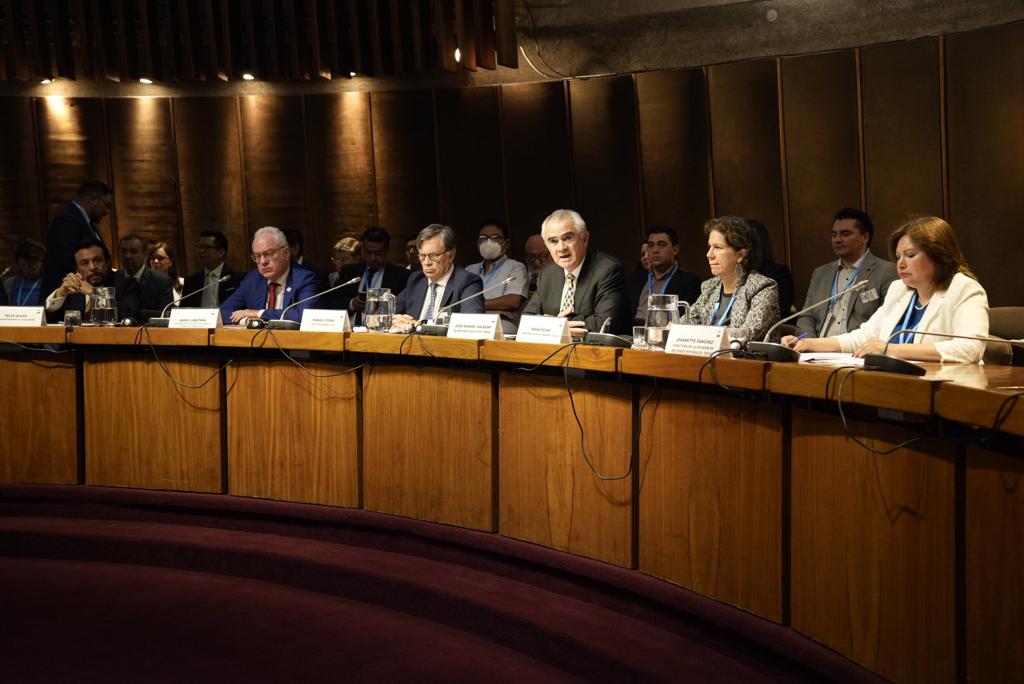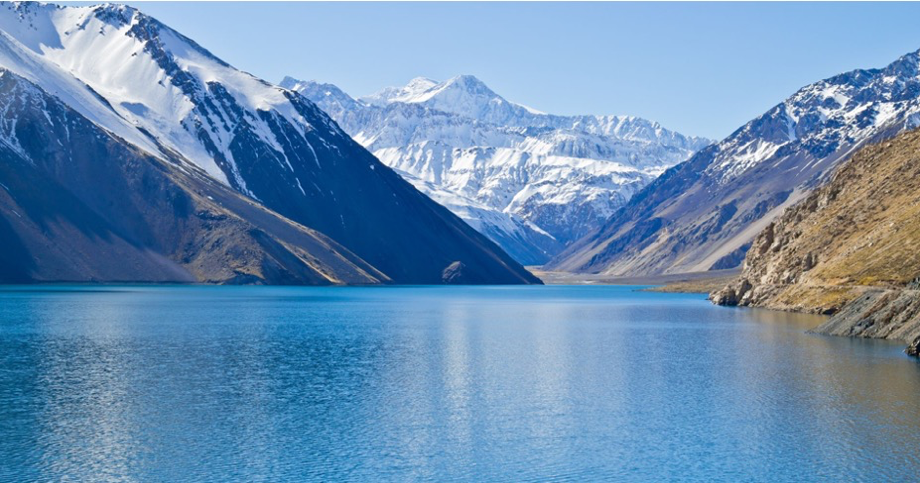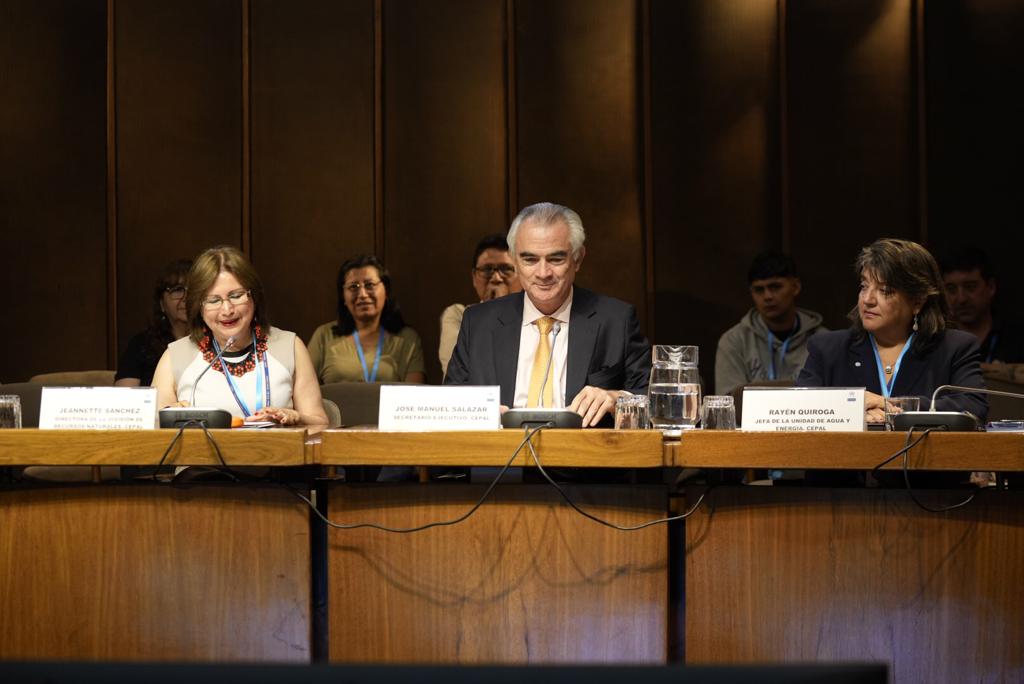ECLAC Urges for Promoting Investment in Water Services to Improve Well-Being, Quality of Life and to Reactivate the Region’s Economy
Work area(s)
Topic(s)
The third edition of the Regional Water Dialogues in Latin America and the Caribbean was inaugurated today at the regional commission’s headquarters in Chile.

The Executive Secretary of the Economic Commission for Latin America and the Caribbean (ECLAC), José Manuel Salazar-Xirinachs, urged countries today to promote investment in water services to improve the population’s well-being and quality of life and to reactivate the region’s economy, during the inauguration of the third edition of the Regional Water Dialogues taking place through Friday, February 3 at the United Nations organization’s headquarters in Santiago, Chile.
The regional commission’s highest authority emphasized that according to ECLAC’s estimates, in order to carry forward a fair and sustainable water transition, universalizing the coverage of safely managed water and sanitation, a public and private investment push equivalent to 1.3% of regional GDP is needed over a 10-year period.
“This would generate 3.6 million green jobs and the corresponding new income for families, thereby constituting a pillar of transformative recovery for countries’ economies, reducing pollutants and increasing resilience to climate change and to health threats such as the pandemic. It is a significant effort, but not impossible,” he contended.
The high-level ministerial event – which is being held using a hybrid format (in-person and virtual) and in preparation for the United Nations 2023 Water Conference, due to take place in New York in March – aims to assess progress related to Sustainable Development Goal 6 (to ensure availability and sustainable management of water and sanitation for all) in the framework of the "Midterm Comprehensive Review of the Implementation of the Objectives of the International Decade for Action, ‘Water for Sustainable Development,’ 2018-2028.”
At this regional meeting, countries will draw up, for the first time ever, a Regional Water Action Agenda, which will allow Latin America and the Caribbean to arrive at the March meeting at UN central headquarters with one voice.
The gathering was inaugurated by Maisa Rojas, Minister of the Environment of Chile; Mariana Mazzucato, Economist and Professor at University College London (UCL) (by video); Manuel Otero, Director General of the Inter-American Institute for Cooperation on Agriculture (IICA); Mario Lubetkin, Regional Representative for Latin America and the Caribbean of the Food and Agriculture Organization of the United Nations (FAO); and José Manuel Salazar-Xirinachs, Executive Secretary of ECLAC. Following the inauguration, Henk Ovink, Special Envoy of the Netherlands to the United Nations, and Pedro Arrojo, Special Rapporteur on the Human Right to Water, spoke at the event.
In his remarks, ECLAC’s Executive Secretary warned that even though water has been recognized as a human right since 2010, in Latin America and the Caribbean, a large part of the population still lacks safely managed water and sanitation services.
He specified that 25% of people have no access to drinking water (161 million people), while 66% of the region’s population (431 million people) have no access to safely managed sanitation services.
“The most vulnerable quintile endures this situation the most, with 25% less access to these services. In addition, and due to the regressivity in water pricing systems, this quintile with the greatest needs can pay up to twice as much, proportionally, as the wealthiest quintile,” he warned.
José Manuel Salazar-Xirinachs noted that in the last three decades, water-related disasters represented 88% of all the events occurring in the region, with very high impact: they amounted to 77% of the reported economic cost and 89% of the total number of people affected by all disasters.
He emphasized that both human life, as well as the dynamics and ecosystem integrity that nourish many of the economic activities critical to sustainable development, depend on the natural water cycle, on its flows in sufficient quantity and quality.
For that reason, he said, “it is essential to recognize that water is key and cross-cutting for practically all economic activities, agriculture, industry and mining, and very especially for the main sectors identified by ECLAC as transformative drivers, which include the bioeconomy, renewable energy, biodiversity, the circular economy and sustainable tourism.”
Finally, ECLAC’s Executive Secretary highlighted that the meeting inaugurated today constitutes a great opportunity to move forward on a shared vision and collective commitment to universal access to water and its integrated management, leaving no one behind and emphasizing this resource’s central and indispensable role for life, health and sustainable development.
Meanwhile, Chile’s Minister of the Environment, Maisa Rojas, recalled the massive drought that has been affecting the country for more than a decade and stressed the urgency of strengthening water governance by establishing a policy for water security, creating a national water authority and institutionalizing governance entities at the level of catchments.
In a video message, Mariana Mazzucato, Economist and Professor at University College London (UCL), sustained that to truly govern water challenges, new ways of thinking about the governance process itself and value creation are needed. She added that innovation and industrial strategy must be conceived as the center of the capacity to address water challenges.
Manuel Otero, Director General of IICA, warned that we are facing a truly serious problem that emphasizes the water issue’s relevance for agriculture and agrifood systems and poses the need to develop and implement innovative systems for more efficient and effective use. He underlined the urgency of establishing joint action at a regional level that would allow for ensuring greater effectiveness in water use.
Mario Lubetkin, Regional Representative of FAO, specified that according to the organization’s estimates, by 2050 global food production will have increased by 50% in comparison with 2012 to meet the growing demand for food. If current conditions hold, this will require at least 35% more fresh water, he warned, calling for managing the Earth’s scarce water resources in a sustainable way.
The sessions of the Regional Water Dialogues 2023 are oriented in line with the UN 2023 Water Conference’s themes: i) Water and climate; ii) Water and sustainable development; iii) Water, financing and health; iv) Water and regional and territorial cooperation; and v) Water, energy and food. High-level national authorities will participate in each of these sessions. In addition, there will be technical sessions to discuss water solutions at various scales to accelerate the achievement of SDG 6 under the water valuation initiative. Moreover, during the Dialogues, ECLAC’s national capacity-building project in Latin America and the Caribbean, known as ROSA: Water Sustainability Network and Observatory, will be launched.
Related content

The 3rd edition of the Regional Water Dialogues in February 2023
The third edition of the Regional Water Dialogues will be held in a hybrid format (onsite and virtually) in Santiago de Chile between February 1st and 3rd, 2023. The main theme will be to accelerate…

Países aprueban la Agenda Regional de Acción por el Agua de América Latina y el Caribe
The document is the main outcome of the Regional Water Dialogues 2023, which concluded today at ECLAC’s headquarters in Santiago, Chile.
Related link(s)
Country(ies)
- Latin America and the Caribbean
Contact
Public Information Unit
- prensa@cepal.org
- (56 2) 2210 2040